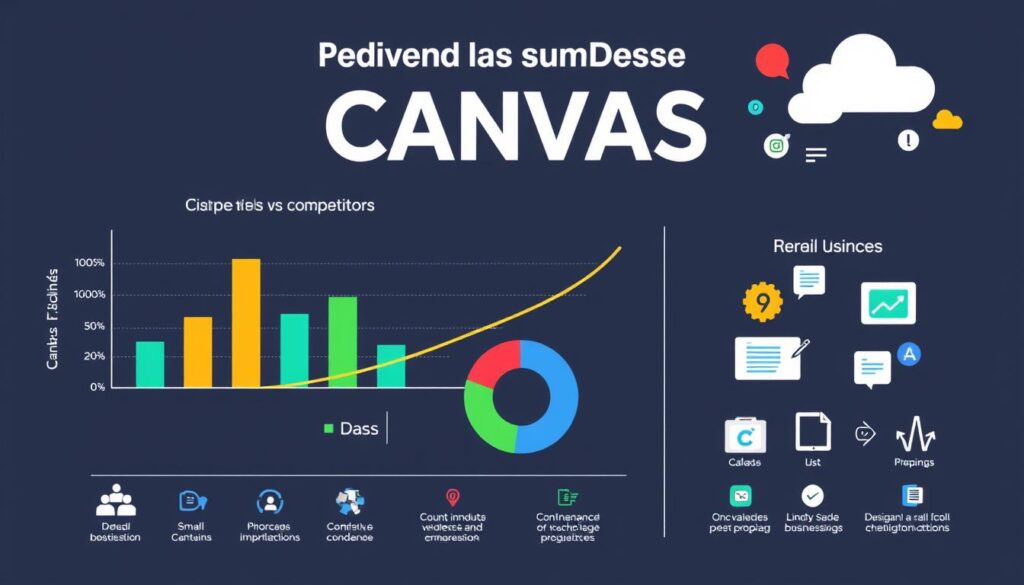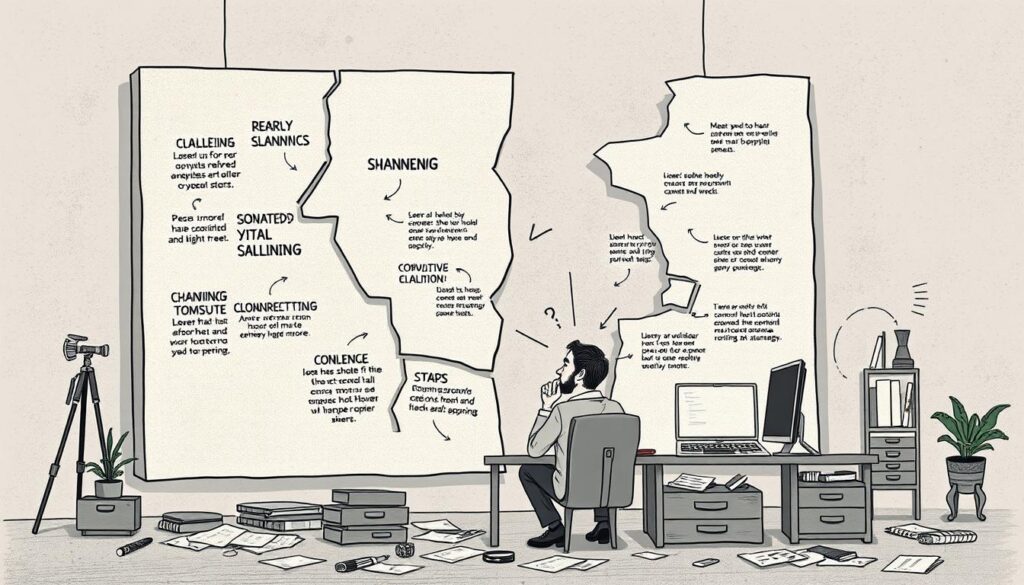‘Canvas Competitors For Small Business Owners‘ Every entrepreneur knows the challenge of finding the right tools for learning and teamwork. As a small business owner, you might have found Canvas LMS too limited. It’s not what your team needs.
Canvas is great for schools, but small businesses need something different. They need tools that are flexible, affordable, and grow with their business. This is why finding the right canvas competitors is so important.
Today’s businesses want tools that are easy to use, work well together, and don’t cost too much. Whether you’re training new staff, improving skills, or setting up professional development programs, the right system can really help your business succeed.
This guide will look at the best Canvas alternatives for small businesses. We’ll check out their features, prices, and how they work. Our goal is to help you choose the best tool for your team’s learning and growth.
Understanding Canvas and its Market Position
Canvas has become a key player in the world of task management and collaboration. It offers special solutions for different needs. With over 1 million users worldwide, it has made a mark in digital learning and project management.

Small businesses looking into digital tools should know about Canvas. It has strong features to make workflow smoother and team talk better.
Core Features of Canvas LMS
- Comprehensive course creation tools
- Advanced learner progress tracking
- Integrated communication channels
- Customizable dashboard interfaces
Current Market Challenges
Despite its good points, Canvas has big challenges in the market. About 60% of small businesses struggle to get better at work. This shows there might be gaps in current task management tools.
| Market Challenge | Impact Percentage |
|---|---|
| Scaling Limitations | 70% |
| Strategic Coherence | 30% |
| Innovation Barriers | 25% |
Target User Base
Canvas mainly aims at schools and training places. It works well there but might not fit small businesses as well.
Knowing these details helps you choose the best digital tool for your business’s needs.
Key Limitations of Canvas for Small Businesses

Small businesses face big hurdles when using Canvas for workflow and team apps. The platform’s complexity can block entrepreneurs from finding easy business solutions.
Key limitations for small businesses include:
- Steep learning curve requiring technical expertise
- Complex user interface that reduces productivity
- Limited customization options for unique business needs
- Pricing structures misaligned with small business budgets
It’s important to know these challenges to make smart tech choices. The Business Model Canvas, created by Alexander Osterwalder in 2004, has nine blocks. This can be too much for those new to business modeling.
| Challenge | Impact on Small Businesses |
|---|---|
| Technical Complexity | 90% of startups struggle with platform navigation |
| Customization Limitations | 70% report insufficient adaptation capabilities |
| Cost Effectiveness | 60% find pricing prohibitive for small operations |
For solopreneurs and small business owners, visual business modeling should make things easier, not harder. While Canvas can offer insights, its strict structure might limit creativity and innovation.
By understanding these limits, you can choose workflow tools that really help your business grow and improve team communication.
Essential Features to Look for in Canvas Alternatives
Finding the right visual planning boards and remote team solutions can boost your small business’s productivity. The digital world has many Canvas alternatives that fit your needs.
When looking at learning management systems and collaboration platforms, some key features are important. They help you make the right choice.
Collaboration Tools That Empower Teams
Good remote team solutions need strong collaboration tools. Look for platforms with:
- Real-time document editing
- Integrated communication channels
- Task assignment and tracking features
- Synchronous and asynchronous collaboration options
Seamless Integration Capabilities
Your chosen platform should work well with your current business tools. Important integration points include:
- CRM system compatibility
- Project management software connections
- Communication platform links
- Data synchronization capabilities
User Experience and Design
A user-friendly interface is key for team adoption and productivity. Look for visual planning boards with:
- Intuitive drag-and-drop interfaces
- Customizable dashboards
- Mobile-responsive design
- Accessible learning curves
By carefully checking these essential features, you can find a Canvas alternative that boosts your team’s collaboration and efficiency.
Canvas Competitors for Small Business Owners
Finding the right agile project tools can be tough for small business owners. Many alternatives to Canvas offer great solutions for improving training and design. These tools can change how you teach and create.
When looking at Canvas alternatives, focus on platforms that are both powerful and easy to use. They should also be affordable. Here are some top competitors in the market:
- Moodle: An open-source learning platform perfect for customization
- Google Classroom: Seamless integration with Google workspace
- Teachable: Ideal for creating and selling online courses
Now, let’s compare these alternatives in detail:
| Platform | Key Features | Pricing |
|---|---|---|
| Moodle | Open-source, highly customizable | Free with self-hosting |
| Google Classroom | Easy integration, collaborative tools | Free with Google Workspace |
| Teachable | Course creation, marketing tools | Starting at $29/month |
Small business owners should think about what they need when choosing agile project tools. Look at the user interface, how well it integrates, and if it can grow with your business. This will help you pick the best learning management system for your company.
The best tools for small businesses are those that fit their unique needs and goals. Try out free trials to see which platforms work best for you before deciding.
Cost Comparison of Leading Canvas Alternatives
When looking at online project management tools, knowing the cost is key for small businesses. Canvas competitors have different prices that can affect your budget and plans.
Pricing Models Breakdown
Canvas rivals have unique pricing plans for different business needs:
- Adobe Express has three plans:
- Free plan: $0
- Premium plan: $8.33 per month
- Teams plan: $4.17 per user monthly
- Visme offers flexible pricing:
- Free plan: $0
- Basic plan: $12.25 per month
- Pro plan: $24.75 per month
- MiriCanvas pricing includes:
- Free plan with 35,000 templates
- Pro plan at $10.93 per month
- Enterprise plan with custom pricing
Return on Investment Analysis
When choosing online project management tools, think about more than just the cost. Consider features, storage, and how it can boost productivity. For example, Adobe Express Premium gives 100GB storage and access to 200 million royalty-free photos. This could save a lot on design costs.
Hidden Costs to Consider
Small businesses should also think about extra costs:
- Implementation costs
- Customization fees
- Training expenses
- Potential data migration costs
Canvas alternatives like Canva Pro at $12.99 monthly offer full solutions. They might save money compared to more complex systems.
User Interface and Experience Comparison
When looking at task management software and collaboration platforms, the user interface is key. Canvas LMS has mixed reviews, with many small businesses finding it hard to navigate.
Learning management systems need to be easy to use. Small businesses want platforms that are quick to learn and boost productivity. Canvas’s complex interface can slow down teams without tech support.
- Learning curve complexity
- Navigation challenges
- User experience gaps
When choosing collaboration platforms, consider these important points:
- Intuitive dashboard design
- Streamlined course management
- Clear progress tracking
| Platform | Ease of Use | Learning Curve |
|---|---|---|
| Canvas LMS | Moderate | Steep |
| EducateMe | High | Gentle |
| Tovuti LMS | Good | Moderate |
Platforms like EducateMe offer easier-to-use interfaces. They focus on flexibility and simplicity. Your team’s success depends on picking a software that fits your comfort level.
Integration Capabilities and Third-Party Support
Choosing the right learning management platform is key. It should work well with your team’s apps to boost productivity. This helps cut down on manual tasks.
Digital platforms need to integrate easily with other software. Your business needs a system that can talk to many different tools smoothly.
API Accessibility
APIs are crucial for connecting tools. Look for platforms with:
- Clear API documentation
- An easy-to-use developer interface
- Strong security measures
- Scalable connections
Available Plugins and Extensions
Plugins can add new features to your platform. Find solutions with many extension options that fit your business needs.
| Platform | Integration Capacity | Third-Party Support |
|---|---|---|
| Miro | 2,500+ integrations | High |
| Lucidspark | 100+ integrations | Medium |
| Box Canvas | Limited integrations | Low |
Custom Integration Options
Some platforms let you create special connections between tools. Workflow automation gets better with these custom options.
Choose platforms with flexible APIs, lots of plugins, and support for custom integrations. This ensures your apps work together smoothly.
Mobile Accessibility and Remote Work Features
In today’s fast-changing work world, small businesses need strong visual planning boards and remote team solutions. These tools must fit flexible work styles. The digital collaboration scene has changed a lot, with new stats showing big shifts in how we work.
Current workplace trends show a big digital change:
- 39% of companies now operate fully remotely
- 23% follow a hybrid work model
- 25% offer open remote work options
- Only 14% remain exclusively in-office
When looking at mobile accessibility for remote work tools, important points come up. Your best platform should mix communication, project management, and teamwork features across many devices.
| Tool | Mobile Accessibility | Remote Work Rating |
|---|---|---|
| ClickUp | iOS/Android Apps | 4.7/5 |
| Airtable | Cross-Platform Support | 4.6/5 |
| Monday.com | Responsive Design | 4.5/5 |
Key mobile features for good remote team solutions include live chat, document sharing, task tracking, and safe login. Choose tools that work well on both desktop and mobile.
Your choice should match functionality, ease of use, and safety. Look for platforms with easy-to-use interfaces, full mobile apps, and strong integration. This will help your small business meet its changing communication needs.
Security and Compliance Standards
Keeping your business data safe is key when picking agile project tools. Small businesses need tools that protect sensitive info well. They should also keep your workflow smooth.
Important security points for small businesses include:
- Data encryption protocols
- Multi-factor authentication
- Regular security audits
- Compliance with industry regulations
When checking security, look for tools that protect well but don’t slow you down. The top agile project tools blend strong security with easy use.
| Security Feature | Importance for Small Businesses |
|---|---|
| End-to-end encryption | Critical for protecting confidential data |
| GDPR/CCPA Compliance | Ensures legal data handling standards |
| Regular Security Updates | Protects against emerging cyber threats |
Remember, security is more than tech; it’s a key business plan. Your tool should show clear security steps and keep improving at finding threats.
Small businesses should choose tools that are safe but easy to use. Find tools that protect well without making your work harder.
Customer Support and Training Resources
Choosing the right canvas competitors for small businesses is key. You need to look at customer support and training resources. Good support can greatly improve your experience with online tools.
Onboarding Process
Starting with a new learning management system should be easy. Top LMS platforms offer great onboarding experiences. They help you learn quickly:
- Interactive product tours
- Video tutorial libraries
- Step-by-step guides
- Personalized support
Technical Support Options
When you face technical issues, fast support is essential. Leading tools offer many ways to get help:
- Live chat support
- 24/7 email help
- Dedicated phone support
- Comprehensive knowledge bases
Community Resources
Strong community resources can also help a lot. Many top competitors offer:
- User forums
- Peer support networks
- Regular webinars
- Certification programs
The right support can boost your team’s learning and productivity. Choosing an LMS is a key decision for small business success.
Conclusion
Choosing the right task management software is crucial for small businesses. The platform you pick can greatly affect your team’s productivity and how well your business runs. It’s important to find a tool that fits your business needs and how your team works.
When looking at Canvas alternatives, focus on what’s important for your team’s success. Look for tools that make teamwork easy, integrate well with other apps, and are easy to use. The best software will grow with your business, helping your team work better and faster.
Small business owners should look for tools that grow with their business, offer good support, and are affordable. The right tool can make your team more productive, improve communication, and help your business grow. Take your time to compare different options, thinking about how easy they are to use, how well they work with other apps, and their value in the long run.
Your goal is to find a task management tool that helps your team, makes complex tasks simpler, and supports your business’s success. By carefully looking at Canvas competitors and their strengths, you can make a smart choice that moves your business forward.
